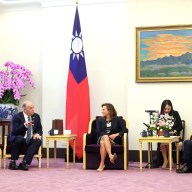Tina Turner was wrong — we do need another hero. Especially fearless women.
As a special gift for my 42nd birthday I met two such women in Kuala Lumpur, where we were attending the Women’s Islamic Initiative in Spirituality and Equality (WISE), a program aimed at improving the status of Muslim women worldwide.
Seyran Ates, 46, a lawyer and women’s rights advocate, was born in Istanbul and has lived in Germany since her family moved there when she was six. She ran away from home at 17 to escape patriarchal traditions and sought refuge in a shelter for battered women.
When she was 21 and living at a women’s centre, young men of Turkish descent broke in and started firing guns. Ates was shot in the throat and almost bled to death. The woman next to her was killed.
Two years ago, as she was about to enter a Berlin courtroom with a client filing for divorce, the husband assaulted the two women. That attack, as well as direct threats against her infant daughter, have persuaded Ates — a single mother who is open about the fact that she never married her daughter’s father — to close her legal practice.
She continues to fight for women in other ways. She’s written several books condemning political Islamic organizations for their misogyny, the right wing in Europe for its racism and hatred, and the left wing for its silence over the violations of Muslim women’s rights. Her latest book is called Islam Needs A Sexual Revolution. I can’t wait for its English translation.
All I can tell you about my second new hero is she is Iranian. Anything else could jeopardize her safety.
Her life has closely mirrored Iran’s ebbs and flows since its 1979 revolution. She was a teenage supporter of that revolution. As a conservative young woman who chose a headscarf she supported its Islamic aspects, which eventually pushed aside the other political strands that had united against the Shah.
But within a decade she became disillusioned with Iran’s direction and embraced instead her country’s feminist movement. I, too, had been a more conservative, headscarf-wearing teenager and it was comforting to trace our parallel moves away from orthodox interpretations of Islam.
They tried to kill Ates twice. They imprisoned my Iranian hero twice.
Solitary confinement was “like death,” she said, and only her spirituality saved her. She is now a “backpack activist” — the regime shut down her organization’s office — and creates online a space activists don’t have in the “real world.”
With women like Ates and my Iranian hero around, we’re well on our way to being wise indeed.
















